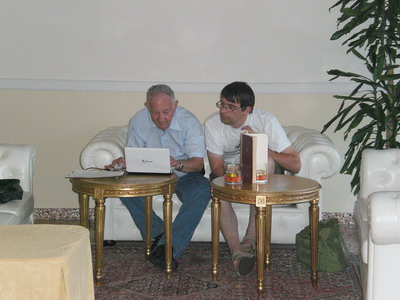OUR TRIP TO CROATIA -
JULY 2010
Doreen and Eitan Levy
After Zagreb, we flew to Dubrovnik. We
loved Dubrovnik - the stone-paved
main street, shaded
side streets always filled with people drinking coffee, the impressive
walls and the sparkling sea. No cars are allowed in the city and there
are no unsightly air-conditioning units on the
buildings, but washing is strung over the heads of the diners across
the streets.
In the distance is the island of Lokrum, a short boat ride away, and a
strenuous walk to the highest point. The cable car was badly damaged
during the 1992 Yugoslavian war, as was
much of the walled city below. During our stay the cable car was
re-inaugurated.You can hold the city below in the cup of
your
hand.
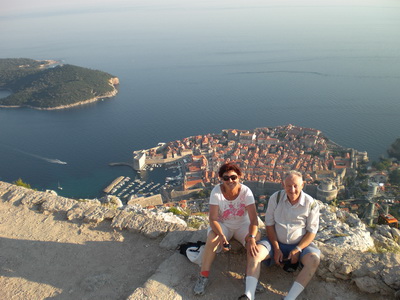
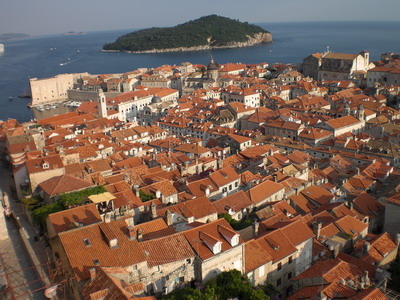
The massive walls have protected the
city for centuries.The city is
surrounded by moats or sea, and to walk along the ramparts is a
must.
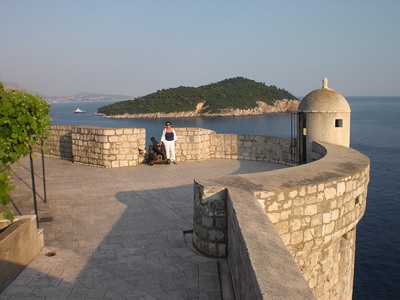
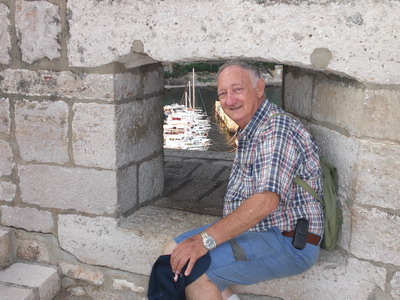
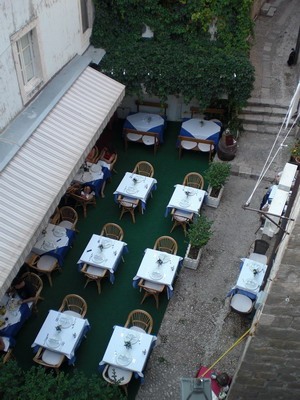
While circumventing the ramparts
we spied our favourite
restaurant in Dubrovnik, Ekvinocijo. The squid was superb. In fact
after the defeat of Holland in the soccer world cup, we took revenge on
the psychic octopus by eating squid or octopus at every meal.
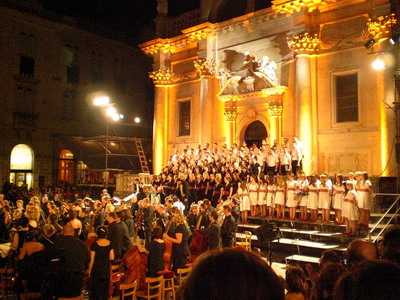
We attended an outstanding performance
of Carmina Burana, part of the
Dubrovnik summer festival. The open-air performance was outside, in
front of St. Blaise's church, on the night of the cup final.
Although the concert started at 23.00 the shouts of joy and celebration
reverberated down the narrow alleys. A fitting background to a piece
about students and their songs.
The hours before an international bridge tournament are always tense
when the last minute decisions must be made. Here Eitan, Chief
Tournament
Director of the European Youth Pairs, sits with Marc van Beijsterveldt,
assistant Chief, both
obviously unhappy.
Our hotel in Opatja was excellent with a lovely view of the marina
below.
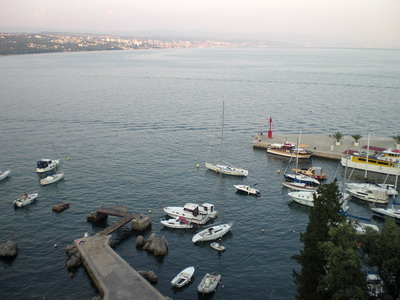
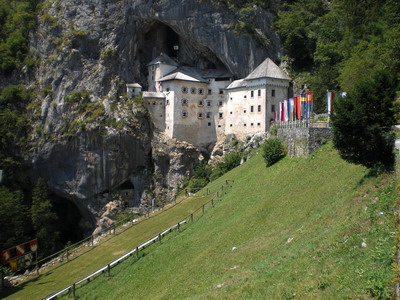
While Eitan was busy with the bridge I took the opportunity to explore.
I popped over to Slovenia to
visit the enormous Postojna Caves. It
seems that there are over 6,000 karstic caves in Slovenia, and
Postojna is the biggest. After entering the cave we took a 20
minute ride in box carts through stalagmite formations and then we
walked for 40 minutes within cavenous spaces filled with beautiful
stalagmites and stalagtites. Afterwards I drove to the
centuries-old Predjama Kastel - a 6 storey castel built within the
mouth of a cave to protect it. They obviously didn't live long enough
in those days to suffer from knee pains!
My
next visit was to the
Istrian
Peninsula. Driving around the peninsular I visited Motovun.
Perhaps it was not surprising to see a fortified mountain
village, evocative of the fortified villages we had seen in Toscana as
this was
built by the Venetians in the 1300’s.
There was even lavender scenting the air.
In Porec I
was amused to see a kiosk featuring
Nutella
crepes. M young grandson Maayan traumatized me by
insisting
that Granny doesn’t know how to make crepes.
I was rather surprised that this 5-year old knew the difference
between a
‘real’ crepe and a fancy pancake. When questioned how did he know he
replied:
“These aren’t crepes – there’s no Nutella!”
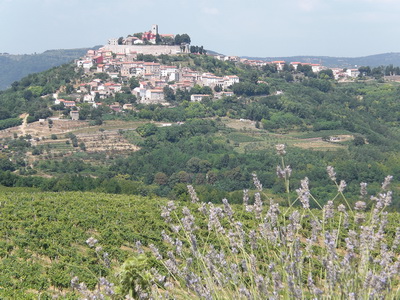
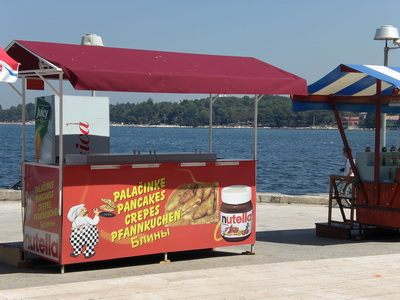
Eitan and I love to pick fruit from
trees by the
wayside.
(For another
occasion, picking wild mulberries in France, see here.) Here
in
Istria
I couldn’t believe my eyes when I saw numerous fig trees bowed down
with dark
delicious fruit that dissolved in your mouth like honey.
Not content with two countries in two days,
and fascinated by the freedom with
which one can cross borders
here, I popped over to
Trieste
in Italy for the day.
James Joyce lived in a number of
apartments here,
moving each time he had to pay the rent.
Now everyone stops to have their picture taken by his statue.
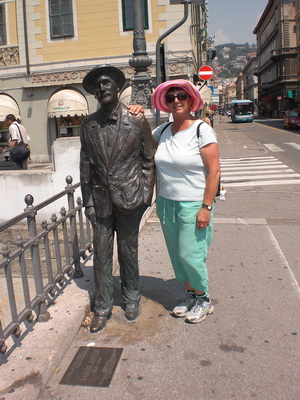
Trieste,
a port city, has even today tax free status. During the 1700’s the
Hapsburg
monarchy developed the town. It replaced the salt ponds with this canal
so
boats could enter right into the city.
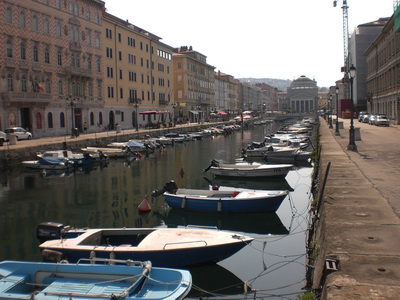
It seems every city in Europe had its Jewish
Quarter and Trieste
was no exception.
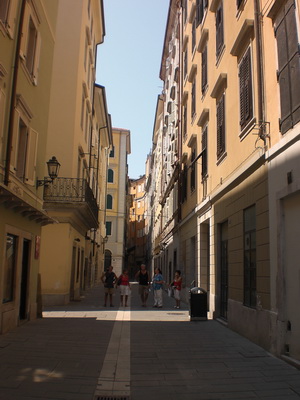
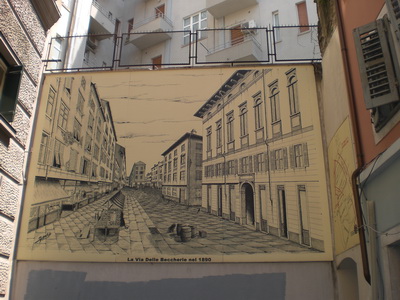
This beautiful building with Lloyd Triestino
carved on the
top brought back many memories. The day after Eitan/Anthony and I got
married
in Durban we sailed for Venice on the
Europa, a Lloyd Triestino
liner. This fountain is interesting in that it depicts four continents
– built
before the discovery of Australasia.
After the bridge competition finished, we spent another 4 days
touring. We drove 4 ½ hours southwards, buffered by high bora
winds whistling
down the mountains sides, to reach
Split.
A long way to drive to see an ancient
city that is a UNESCO World Heritage Site; but we weren’t disappointed.
Split
was built by Diocletian as a palace and mausoleum, but far from being
another
ruin, the modern city has sprung up inside its walls.
Much of
Diocletian’s octagonal mausoleum was dismantled and the
Cathedral of St
Domnius built in its stead. But ask the locals where are the statues of
Diocletian and his wife in the church they all shake their hands and
say: “No
statue, no statue..
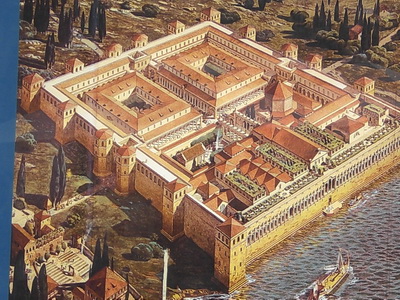
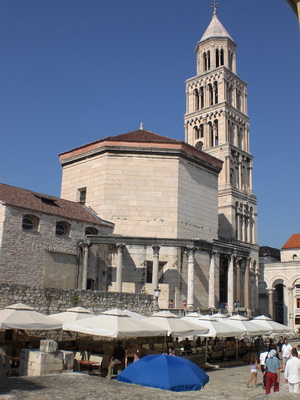
Both touristy and authentic, Split has ‘soldiers’
guarding
the daily appearance of ‘Diocletian’, while inside one of the banks
there is a
benchmark depression, from where all distances were measured, as well
as an
ancient drain cover. It is very much a living city.
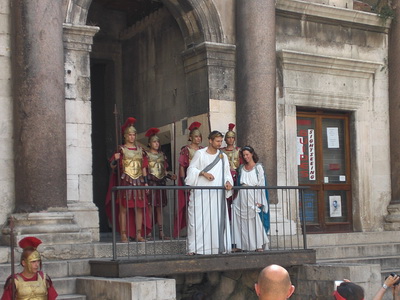
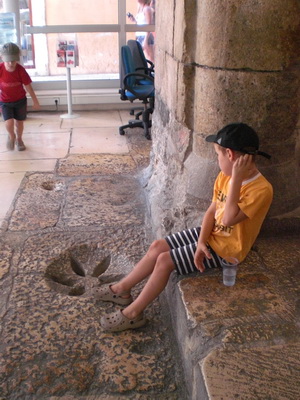
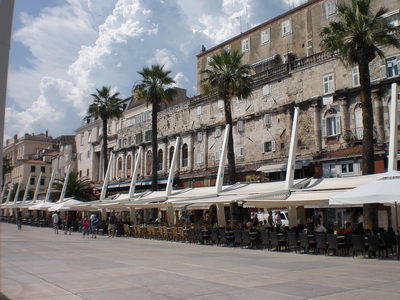
We walked to the waterfront, busy with ferry traffic, and tried out the
regal chairs carved out of stone. (
See
This Week's Picture). The south wall of Diocletian's Palace was on
the sea front, and if you look carefully you can
see the ancient stone pillars incorporated into later buildings on the
waterfront.
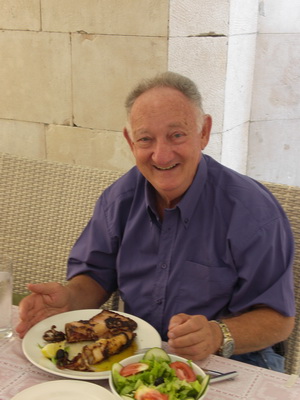
The sea food here, as in most of Croatia, is delicious, and Eitan is
about to enjoy another squid meal at a
restaurant recommended by a waiter from another restaurant in the the
adjoining
square
After Split we drove up the Dalmatian coast to
Zadar. We could not help
being impressed by the many inlets, islands and peninsulas hugging the
Dalmatian coast, like the little village of Primosten.
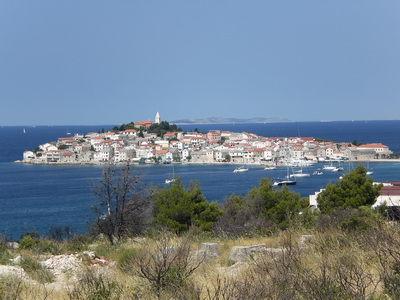
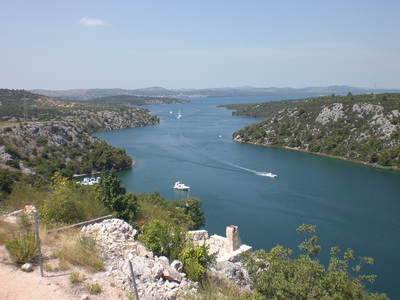
For us the highlight of Zadar, besides picking plums
from a tree in
the parking lot and another delicious sea food meal, was the Sea
Organ. It was built and designed by Nikola Basic.
As waves lap or crash through a series of pipes below the stone steps
they
cause a moaning or sighing that is mesmerizing, recalling communication
between
whales. Another interesting feature of the promenade is the Sun
Salutation that
absorbs the sun’s energy during the day and emits it at night as light,
lighting up the promenade..
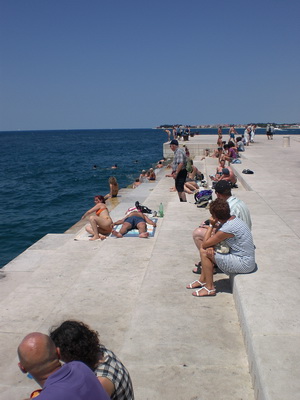
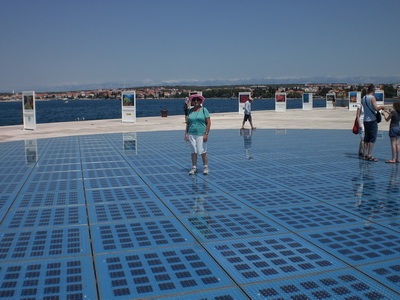
We then drove inland to the
Plitvice
Natural Park. It
is a series of lakes that spill into each
other through an endless series of
waterfalls.
We have traveled to many
places where there is water wherever you look. Here, wherever you
looked there
were waterfalls. It was truly beautiful.
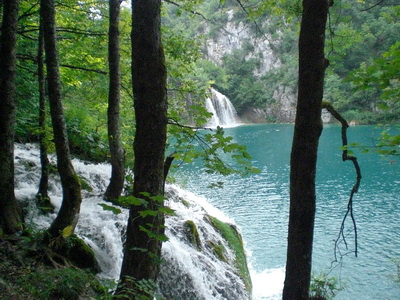
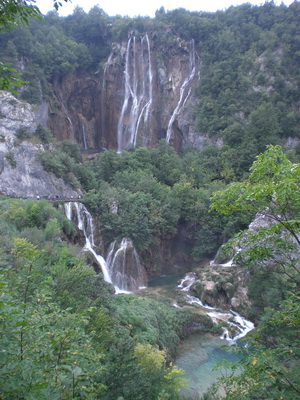
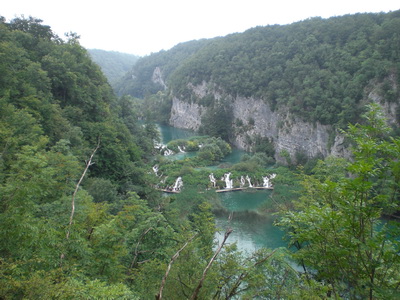
And then back to Rijeka for our last night in Croatia. We met Branka
and Goran Grguric, of the Croatian Bridge Federation, who were the
on-site organizers of the bridge competition. We went with them to
their favorite local fish restaurant we we enjoyed an excellent
meal.

